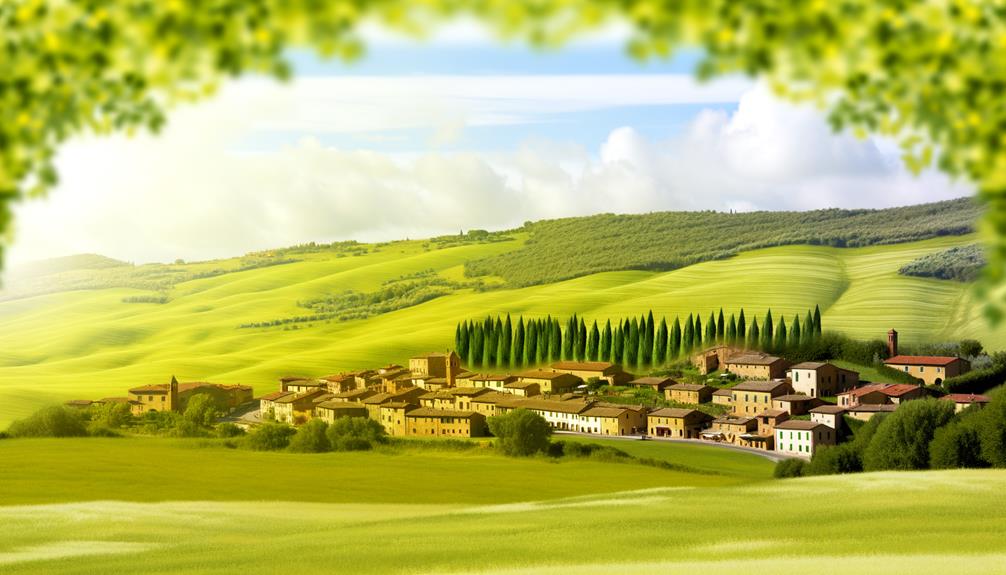Giovanni Name Meaning in English
Giovanni, an Italian name, derives from the Hebrew 'Yochanan,' meaning 'God is gracious.' It has evolved through Greek 'Ioannes' and Latin 'Johannes,' reflecting linguistic and cultural shifts over centuries. The name enjoys deep historical roots within Christian traditions and remains esteemed for its association with divine favor.
Giovanni's enduring popularity attests to its timeless appeal and its adaptability across different eras and regions, including prominence in Italian-American communities. Its link to religious heritage and prevalence in media affirm Giovanni's continued cultural significance.
To uncover more about its fascinating journey and use over time, continue exploring its rich history. Giovanni’s transcultural significance can also be seen in its use as a popular surname and its inclusion in various literary works and artworks. Additionally, the name’s connections to ancient Roman name meanings further illustrate its enduring legacy and adaptability. Exploring Giovanni’s rich history reveals not only its linguistic evolution but also its enduring impact on global culture.

Key Takeaways
- Giovanni means 'God is gracious,' originating from the Hebrew name Yochanan.
- The name evolved through Greek Ioannes and Latin Johannes before becoming Giovanni.
- Giovanni has deep religious significance, especially within Christian traditions.
- The name is popular in Italian and Italian-American communities, reflecting cultural heritage.
- Giovanni features prominently in literature, film, and television, enhancing its appeal.
Origin of Giovanni
The name Giovanni has its roots in the Hebrew name Yochanan, which translates to 'God is gracious' and was later adopted and adapted through Greek as Ioannes and Latin as Johannes.
This etymological journey highlights the cultural and linguistic transformations that the name has undergone over centuries. Initially, Yochanan was a common name in ancient Hebrew culture, reflecting a deeply held religious sentiment. As it traversed through time and geography, it was Hellenized to Ioannes, retaining its spiritual connotation.
The Latin adaptation, Johannes, further cemented its presence in ecclesiastical and secular contexts. Giovanni emerged in Italy, preserving the original meaning while adapting to local phonetics and cultural nuances, reflecting the intricate interplay of language evolution and cultural exchange.
Meaning of Giovanni
Understanding the meaning of Giovanni requires a closer examination of its linguistic roots and cultural significance, which are deeply intertwined with its etymological origins in the Hebrew name Yochanan. The name Yochanan translates to 'God is gracious' or 'God's gift,' a sentiment retained through its evolution into the Italian Giovanni.
This transformation underscores the name's spiritual and cultural resonance, particularly within Christian contexts where divine grace is a central theme. Giovanni, hence, carries a profound meaning reflecting divine favor and benevolence.
The name's enduring popularity in Italy and beyond highlights its timeless appeal, rooted in a rich tapestry of linguistic development and religious significance, making it a meaningful choice for many across different cultures.
Historical Significance
The name Giovanni, deeply rooted in Italian culture, originates from the Hebrew name Yohanan, meaning 'God is gracious.'
Historically, it has been a prominent name, reflecting significant religious and cultural influences, particularly within Christian contexts.
Over centuries, Giovanni has evolved, maintaining its importance across various epochs and regions, demonstrating its enduring appeal and adaptability.
Cultural and Religious Roots
Rooted in the rich tapestry of Italian culture and history, the name Giovanni traces back to its Hebrew origin, Yohanan, meaning 'God is gracious.'
The name found its way into Italian nomenclature through early Christian traditions, particularly as the Italian form of John, a name of significant biblical importance. Giovanni gained prominence during the Middle Ages when religious names were widely adopted to reflect piety and devotion.
Its association with numerous saints and historical figures further cemented its cultural relevance. In Italy, the name Giovanni encapsulates a deep sense of religious heritage and an enduring connection to Christian values, making it a perennial favorite among Italian families.
This cultural and religious legacy underpins the enduring popularity of the name Giovanni.
Name's Evolution Over Time
Throughout centuries, the name Giovanni has evolved in both form and significance, reflecting broader social, cultural, and linguistic shifts in Italian society.
Originating from the Latin name 'Ioannes,' itself derived from the Hebrew 'Yochanan,' meaning 'God is gracious,' Giovanni has maintained religious importance through its association with various saints, particularly John the Baptist.
During the Middle Ages, the name proliferated across Italy, becoming a staple in both noble and common families.
The Renaissance period saw Giovanni become synonymous with intellectual and artistic prowess, exemplified by figures like Giovanni Boccaccio.
Over time, regional variations such as Gianni and Vanni emerged, illustrating the name's adaptability and enduring popularity within diverse Italian dialects and traditions.
Cultural Impact
The name Giovanni holds substantial cultural significance, particularly in Italy where it has been a dominant name through various historical periods. Its influence is evident in the modern adaptation of names and its presence in popular culture, from literature to cinema.
Understanding Giovanni's cultural impact involves examining these dimensions to appreciate its enduring legacy.
Historical Significance in Italy
In Italy, the name Giovanni has held significant cultural and historical influence, symbolizing both religious devotion and artistic heritage. Rooted in the Latin name Johannes, Giovanni is synonymous with Saint John the Baptist and Saint John the Apostle, key figures in Christian history.
This religious connection solidified Giovanni's prevalence during the Middle Ages, a period when naming conventions were heavily influenced by biblical figures. Additionally, numerous Italian artists, poets, and scholars bore the name Giovanni, contributing to its cultural resonance.
Prominent individuals like Giovanni Boccaccio and Giovanni Bellini have left indelible marks on literature and art, respectively. Therefore, Giovanni embodies a blend of spiritual reverence and intellectual legacy, deeply woven into Italy's historical tapestry.
Influence on Modern Names
Influence on modern names, particularly within Italian and broader European cultures, underscores Giovanni's enduring legacy as a timeless symbol of both religious and intellectual heritage. The name Giovanni, derived from the Hebrew Yohanan meaning 'God is gracious,' has left an indelible mark on various naming conventions.
Its impact is evident through several derivative forms:
- Juan: The Spanish adaptation, widely popular in Spanish-speaking nations.
- Jean: The French variant, often encountered in historical and contemporary contexts.
- John: The English equivalent, deeply rooted in both religious texts and common usage.
- Johann: The Germanic form, frequently found in classical music and literature.
These variations highlight Giovanni's widespread cultural resonance, illustrating its historical and linguistic evolution across Europe.
Giovanni in Popular Culture
How has Giovanni's presence permeated various facets of popular culture, from literature and cinema to music and art, demonstrating its extensive cultural impact?
Historically, the name Giovanni has been immortalized in literary works such as 'Don Giovanni' by Mozart, which later inspired numerous operatic and theatrical adaptations.
In cinema, the name appears in films like 'Giovanni's Room,' reflecting its deep roots in storytelling.
Musically, artists and composers have adopted the name, further cementing its cultural resonance.
In art, Giovanni Bellini's Renaissance masterpieces underscore the name's historical and artistic significance.
Each instance of Giovanni in popular culture not only highlights its versatility but also its enduring legacy, solidifying its place in the cultural lexicon.
Famous Bearers
Prominently, the name Giovanni has been borne by several influential figures throughout history, each leaving a lasting impact in their respective fields. This name, rooted in the Italian tradition and derived from the Hebrew name Yohanan, has been synonymous with excellence and creativity.
- Giovanni Boccaccio: An Italian writer and poet, best known for his work 'The Decameron,' which notably influenced Renaissance literature.
- Giovanni Bellini: A master of the Venetian school of painting, whose contributions to the use of color and landscape were crucial in the development of Renaissance art.
- Giovanni Pierluigi da Palestrina: A Renaissance composer whose works are considered the epitome of sacred music.
- Giovanni Cassini: An astronomer who made groundbreaking discoveries, including the gaps in Saturn's rings.
Modern Popularity
In contemporary times, the name Giovanni remains a popular choice, reflecting both its rich historical legacy and its enduring appeal in modern culture. Originating from the Italian form of John, which means 'God is gracious,' Giovanni has consistently ranked high in baby name lists.
Its use spans various cultures and countries, demonstrating a timeless quality. The name is particularly prevalent in Italian-American communities, where it embodies a connection to heritage and tradition. Additionally, contemporary media, including literature, film, and television, frequently features characters named Giovanni, further solidifying its presence in popular culture.
This blend of historical depth and modern relevance secures Giovanni's continued popularity across generations.
Conclusion
In sum, Giovanni, a name deeply rooted in the rich soil of Italian heritage, carries the profound meaning of 'God is gracious.' Its historical significance spans centuries, influencing various cultural landscapes and bearing the weight of numerous illustrious individuals.
The name's etymological journey from Hebrew to Latin to Italian encapsulates a timeless appeal.
In contemporary times, Giovanni remains a beacon of cultural and historical resonance, embodying a legacy that continues to thrive.






